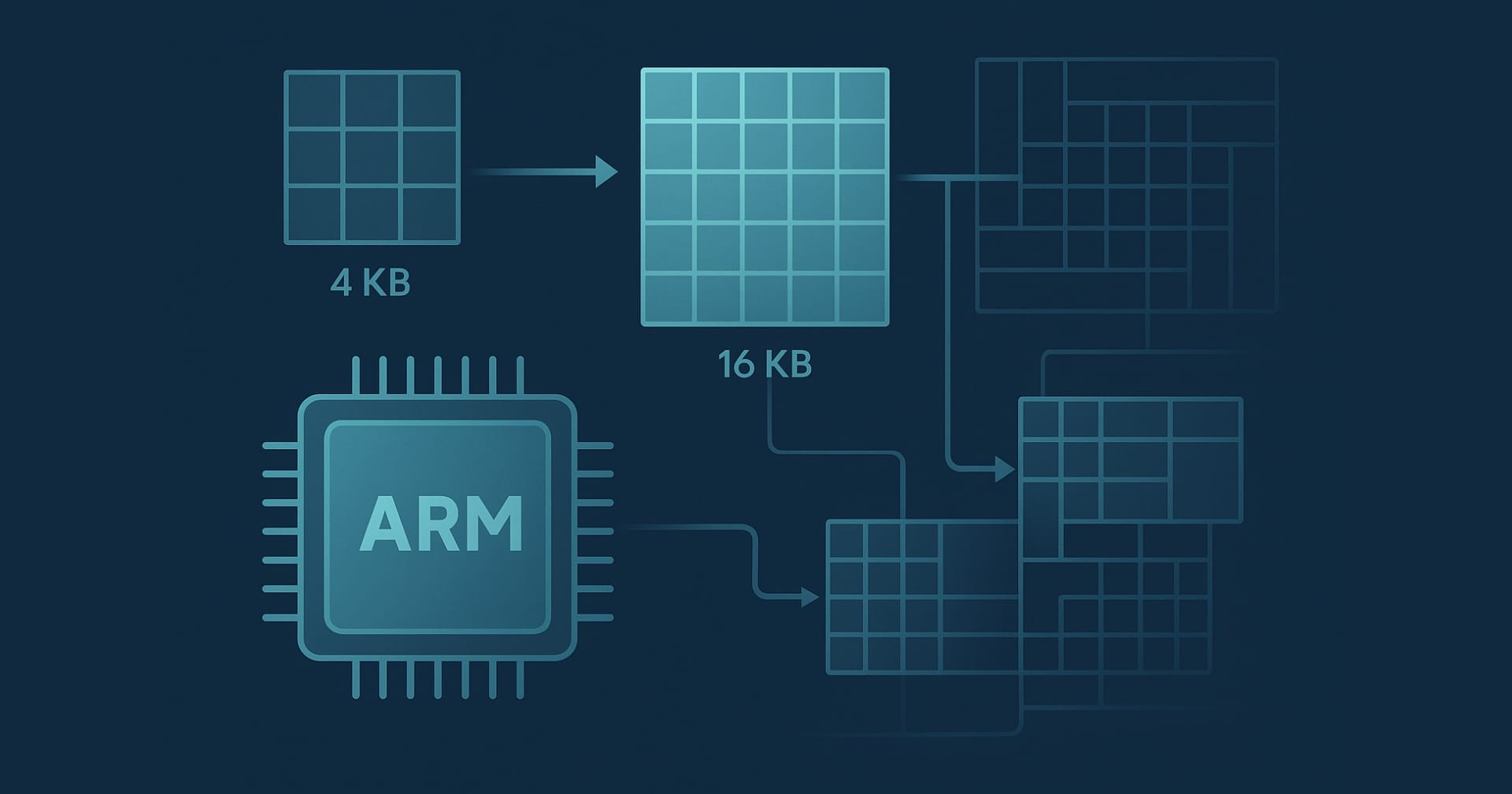Welcome to SitePoint!
Access a huge library of books and courses
On various topics: JavaScript, Python, AI, and more!
Use arrows to navigate
Browse our comprehensive collection of courses, books, and tutorials on a wide range of development and design topics.
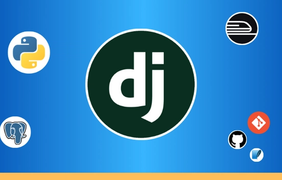
video

video
·
★ 5.0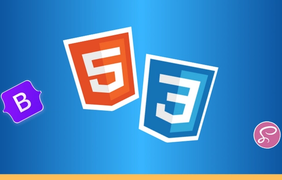
video
·
★ 5.0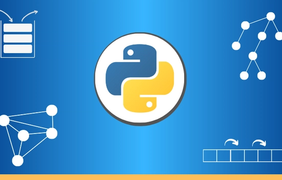
video
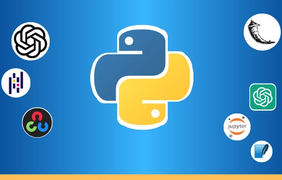
video
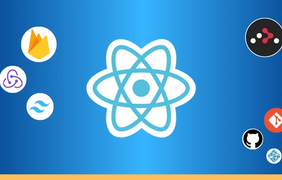
video
·
★ 4.5Browse our comprehensive collection of courses, books, and tutorials on a wide range of topics.
The home for developers
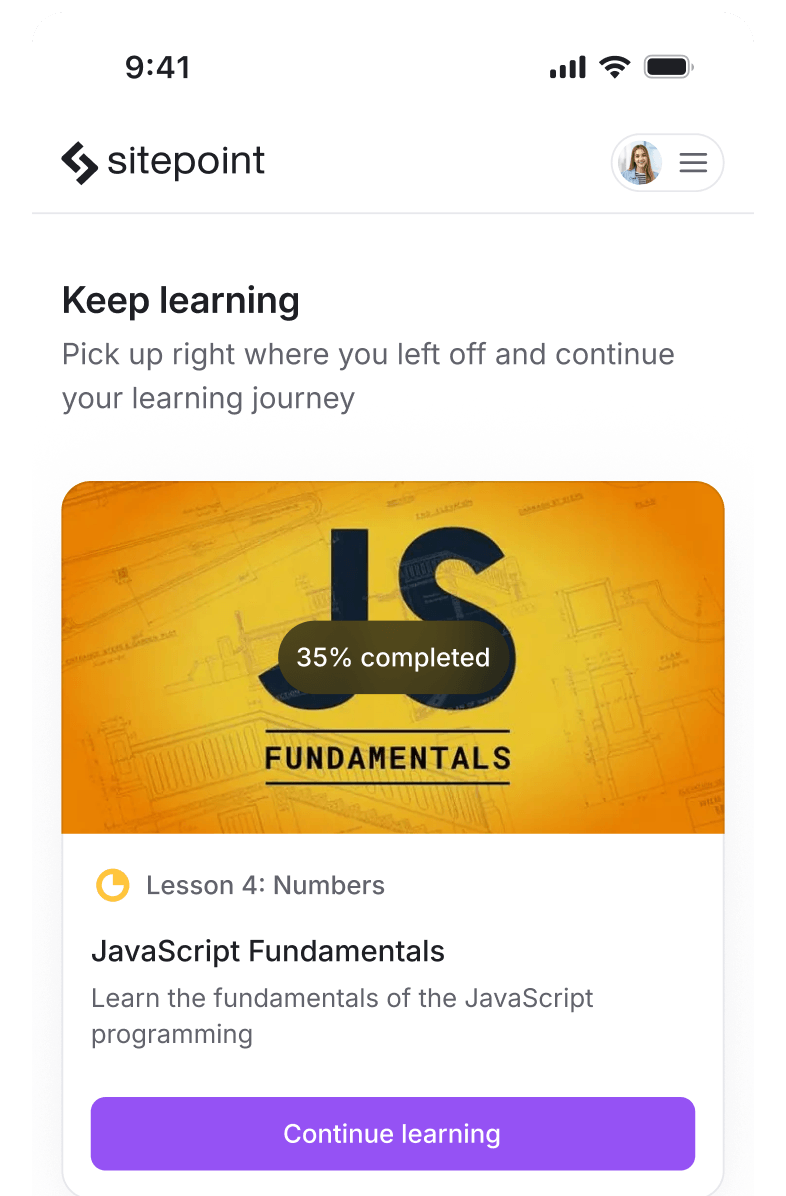
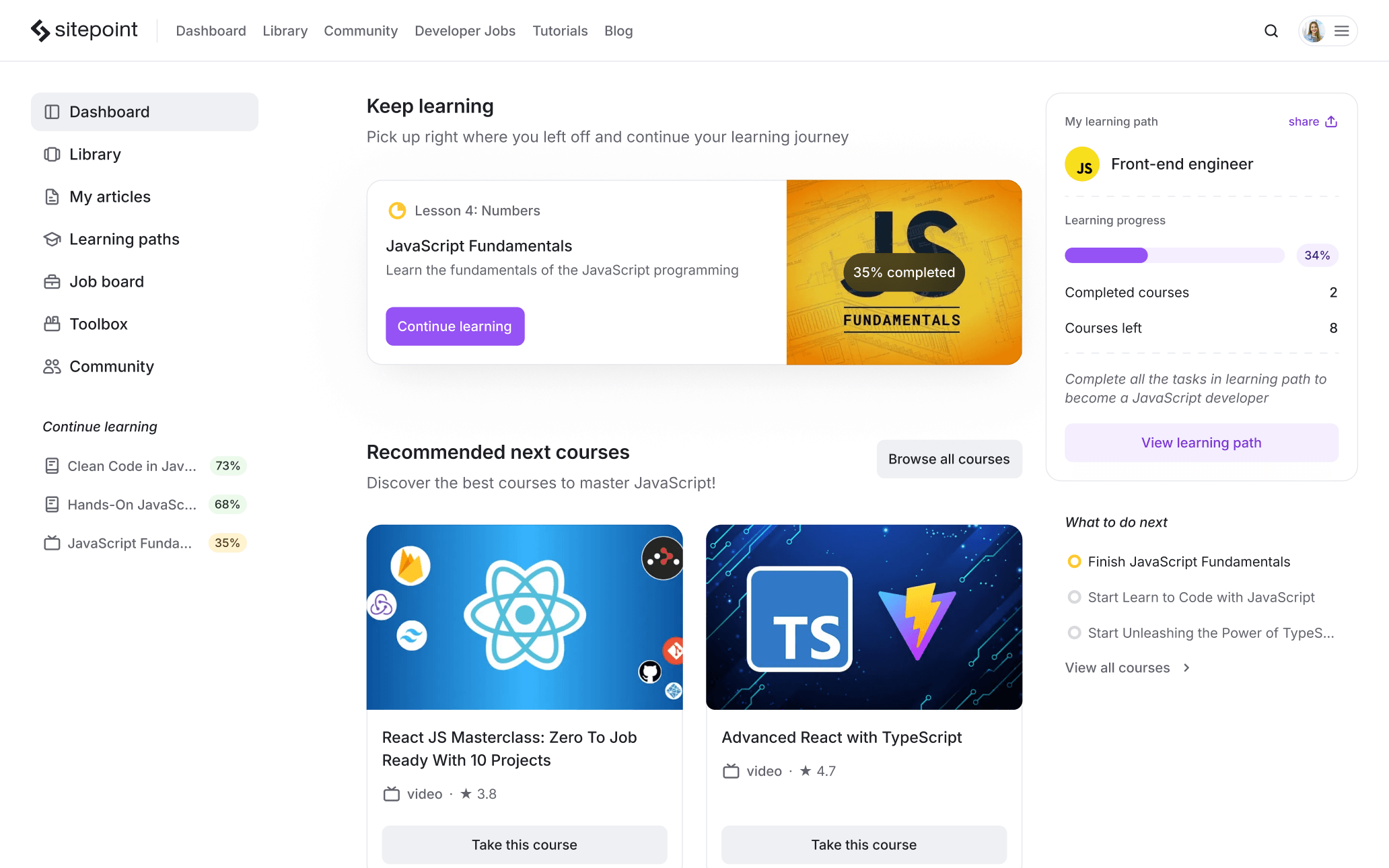

... I joined SitePoint to learn more about web stuff and their PHP/MySQL tutorial was probably the first I used.
Creator of WordPress, CEO of Automattic
Whether you’re a full-stack developer, designer, or looking to get into AI, we’ve got a path for you.
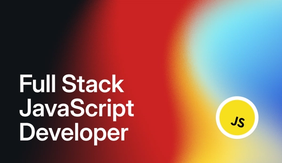
Learn JavaScript, the language of the web. Then deep dive into some popular frontend and backend JavaScript frameworks and start your Full Stack career the right way.

Learn JavaScript, the language of the web. Then deep dive into some popular frontend and backend JavaScript frameworks and start your Full Stack career the right way.
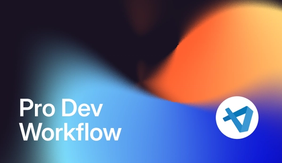
Learn JavaScript, the language of the web. Then deep dive into some popular frontend and backend JavaScript frameworks and start your Full Stack career the right way.

Learn JavaScript, the language of the web. Then deep dive into some popular frontend and backend JavaScript frameworks and start your Full Stack career the right way.
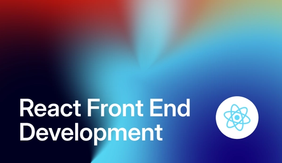
Learn JavaScript, the language of the web. Then deep dive into some popular frontend and backend JavaScript frameworks and start your Full Stack career the right way.

Learn JavaScript, the language of the web. Then deep dive into some popular frontend and backend JavaScript frameworks and start your Full Stack career the right way.
Discover our library filled with learning paths for all kinds of learners.
Browse thousands of jobs in Software Development
1d ago
Job Title: Subsidence Technician - Claims Handler Location: Remote (UK-based) Salary: £28,000 - £32,000 per annum, depending on experience Were working with a respected and growing insurance organisation looking to expand their specialist claims team with the addition of a Subsidence Technician. If you have experience handling property claims with a technical edge, this is a fantastic opportunity to join a team where your knowledge will be valued and your growth supported. About the Role As a Subsidence Technician, youll be responsible for managing a portfolio of subsidence claims from first notification through to resolution. Working closely with surveyors, engineers and contractors, youll play a vital role in diagnosing root causes, coordinating investigations, and ensuring fair and efficient claim settlements. This is a varied and rewarding position suited to someone who enjoys a mix of technical detail, customer service, and problem-solving. Key Responsibilities Handle a caseload of subsidence claims end-to-end Interpret structural reports and provide informed decisions on next steps Liaise with policyholders, loss adjusters, surveyors and third-party suppliers Review policy cover, manage liability decisions and authorise repairs or settlements Maintain clear and accurate records, ensuring compliance with FCA and company standards Keep customers updated with empathy and professionalism throughout the process What Were Looking For Previous experience managing property claims, ideally with exposure to subsidence Strong technical understanding of buildings insurance or related surveying knowledge Confident communicator with the ability to explain complex issues clearly Highly organised and capable of managing multiple cases at different stages A calm, investigative mindset and a natural problem-solver Comfortable working independently in a fully remote setting Whats on Offer A competitive salary between £28,000 and £32,000 Full remote work Supportive team culture and ongoing professional development Opportunities to progress in a specialist technical role Access to company benefits including pension, holidays, and wellbeing support This is a great move for someone looking to step into a more specialist role, or for a technician who wants the flexibility of remote work without compromising on career development. If youre ready for a new challenge where your expertise makes a real difference, wed love to hear from you. Apply now or get in touch for more details.
1d ago
COMPANY OVERVIEW Our client is leading provider of IT services and EPOS Solutions, to some of the UK's biggest retail and hospitality brands. JOB PURPOSE Our client has secured a new IT upgrade contract which will last for the next 4 - 12 weeks on a contract basis. The ideal candidate will have an appreciate of IT and / or Electronic equipment and have clean driving license as the positons is field based. You don't need to have any EPOS experience—if you've worked in a field service role (even in a different industry), have a driving licence, and enjoy solving problems on the go, this could be your next big move. Attend customer sites to install or swap out retail IT equipment Deliver great customer service and maintain a professional appearance Manage parts and stock from your company vehicle Complete all tasks to a high standard using our mobile job management system Support project rollouts and periodic training at HQ SKILLS & EXPERIENCE Clean driving licence and access to a van form Monday to Friday 8am - 5pm Manual Handling training Experience working in retail environments on EPOS equipment A medium-sized van (e.g. Transporter or Transit) Steel toe cap boots Strong work ethic Calm, friendly attitude in busy or high-pressure environments Ability to manage multiple callouts per day and communicate ETAs clearly Comfortable working across a variety of retail settings (e.g. high street, petrol stations) Flexible to adapt to changing priorities or emergency callouts Good attention to detail - accurate logging of job info, serials, and parts used Physically capable - able to carry a toolkit, crouch/kneel, and work in tight spaces Able to work independently with minimal supervision Their own mobile device with internet access - access to our platform will be provided for call updates RATES £130 Per Day - £140 Per Day (DOE) Mileage allowance offered Training provided Start date 4th August 2025 Please call Clare on 07799 886594 and please apply to this advert to prompt a callback
1d ago
COMPANY OVERVIEW Our client is leading provider of IT services and EPOS Solutions, to some of the UK's biggest retail and hospitality brands. JOB PURPOSE Our client has secured a new IT upgrade contract which will last for the next 4 - 12 weeks on a contract basis. The ideal candidate will have an appreciate of IT and / or Electronic equipment and have clean driving license as the positons is field based. You don't need to have any EPOS experience—if you've worked in a field service role (even in a different industry), have a driving licence, and enjoy solving problems on the go, this could be your next big move. Attend customer sites to install or swap out retail IT equipment Deliver great customer service and maintain a professional appearance Manage parts and stock from your company vehicle Complete all tasks to a high standard using our mobile job management system Support project rollouts and periodic training at HQ SKILLS & EXPERIENCE Clean driving licence and access to a van form Monday to Friday 8am - 5pm Manual Handling training Experience working in retail environments on EPOS equipment A medium-sized van (e.g. Transporter or Transit) Steel toe cap boots Strong work ethic Calm, friendly attitude in busy or high-pressure environments Ability to manage multiple callouts per day and communicate ETAs clearly Comfortable working across a variety of retail settings (e.g. high street, petrol stations) Flexible to adapt to changing priorities or emergency callouts Good attention to detail - accurate logging of job info, serials, and parts used Physically capable - able to carry a toolkit, crouch/kneel, and work in tight spaces Able to work independently with minimal supervision Their own mobile device with internet access - access to our platform will be provided for call updates RATES £130 Per Day - £140 Per Day (DOE) Mileage allowance offered Training provided Start date 4th August 2025 Please call Ben on 07498 889444 and please apply to this advert to prompt a callback
1d ago
COMPANY OVERVIEW Our client is leading provider of IT services and EPOS Solutions, to some of the UK's biggest retail and hospitality brands. JOB PURPOSE Our client has secured a new IT upgrade contract which will last for the next 4 - 12 weeks on a contract basis. The ideal candidate will have an appreciate of IT and / or Electronic equipment and have clean driving license as the positons is field based. You don't need to have any EPOS experience—if you've worked in a field service role (even in a different industry), have a driving licence, and enjoy solving problems on the go, this could be your next big move. Attend customer sites to install or swap out retail IT equipment Deliver great customer service and maintain a professional appearance Manage parts and stock from your company vehicle Complete all tasks to a high standard using our mobile job management system Support project rollouts and periodic training at HQ SKILLS & EXPERIENCE Clean driving licence and access to a van form Monday to Friday 8am - 5pm Manual Handling training Experience working in retail environments on EPOS equipment A medium-sized van (e.g. Transporter or Transit) Steel toe cap boots Strong work ethic Calm, friendly attitude in busy or high-pressure environments Ability to manage multiple callouts per day and communicate ETAs clearly Comfortable working across a variety of retail settings (e.g. high street, petrol stations) Flexible to adapt to changing priorities or emergency callouts Good attention to detail - accurate logging of job info, serials, and parts used Physically capable - able to carry a toolkit, crouch/kneel, and work in tight spaces Able to work independently with minimal supervision Their own mobile device with internet access - access to our platform will be provided for call updates RATES £130 Per Day - £140 Per Day (DOE) Mileage allowance offered Training provided Start date 4th August 2025 Please call Ben on 07498 889444 and please apply to this advert to prompt a callback
1d ago
This is a hands-on, cross-functional role focused on translating business needs into digital solutions that improve customer experience and drive growth. What You'll Be Doing: Act as the link between business teams, HQ, technical partners, and vendors to ensure shared understanding across all digital initiatives. Work alongside Project Managers to deliver key projects from the digital roadmap. Capture, analyse, and document business requirements using tools like Jira and Confluence. Write clear user stories and acceptance criteria to support successful development cycles. Design and visualise process flows and improvements (current vs. future state). Lead and support user acceptance testing (UAT) and technical validations. Champion delivery best practices and continuous improvement across the PMO. What You'll Bring: Experience in digital/eCommerce operations, analysis, or delivery. Proven ability to turn business goals into functional and technical documentation. Familiarity with eCommerce platforms (Hybris preferred) and enterprise systems like SAP. Strong analytical and communication skills, with experience using Jira, Confluence, and Visio. Ability to work independently while staying collaborative, with a genuine passion for digital innovation. Working knowledge of HTML, JavaScript, XML, or JSON is a bonus. Experience with Adobe Analytics or similar tools is a plus. What Success Looks Like: Accurate, actionable user stories and process documentation. Strong collaboration with internal teams, HQ, and third parties. Clean backlogs with minimal outstanding issues. Proactive contributions to improving digital operations and delivery efficiency. Additional Information: 12 Month Fixed Term Contract 37.5 hours per week 25 days' annual leave Discretionary performance-based bonus scheme Defined Contribution Pension (up to 4% employee, up to 8.5% employer) Permanent Health Insurance Flexible Benefits allowance Private Medical Insurance Ready to shape the future of Digital Commerce? Apply now!
1d ago
At Telent, you will have the opportunity to be a part of something bigger. To keep things moving, to connect people. It's important work we do. Learning together, inspiring colleagues, and making the entire organisation better. Join us and help keep the nations critical networks connected and protected 24/7. Working under the direction of the Duty Manager / Team Leader. The level 4 will carry out maintenance activities on communications systems ona shift rotation. What you'll do: Use of specialist tools & test equipment required to maintain systems to specification Report progress against schedule Able to work from SSPs to complete planned maintenance activities Supports overall delivery of the works allocated, meeting requirements on time, of a high standard and aim for first time resolution Monitor work progress and handle any issues that arise or work with team to mitigate and manage them Keep the internal team up to date on progress of allocated works Ability to prepare clear and concise reports, briefings and correspondence Utilising field IT equipment to provide real time corrective and planned maintenance data Who you are: This role would be ideal for an individual who has an understanding of station communication faults and a knowledge of Network Rail health and safety. Key Requirements: Full drivers licence Erect scaffold Good verbal and written communication and presentation skills and ability to prepare clear and concise reports, briefings and correspondence Solid organisational skills, including multitasking and time-management Strong client-facing and teamwork skills Excellent knowledge of Microsoft suite IRSE License if applicable for safety critical systems Competent on a minimum of 2 system groups . What we offer: A career at Telent can span many sectors, roles, technologies and clients giving you the opportunity to develop, learn new skills and make an impact. We are growing and we rely on our committed Team to deliver. We nurture the talent that makes this happen, by our on-going commitment to creating an inclusive culture that respects and values difference, that celebrates diverse ideas. We want everyone to feel they can be themselves and to thrive at work. The additional benefits with this role: 34 days holiday, including public holidays, plus the option to buy or sell five days each year Company pension scheme A range of family friendly policies Occupational health support and wellbeing Portal Discounts on Cinema, Restaurants and Shopping with Telent Reward scheme Learn more about Telent: Click here for Telent Video! Brilliance brought together. TJ-ONSITE LI-Onsite About Telent Telent is a leading technology company and specialist in the design, build, support and maintenance, drawing on decades of experience in mission critical communications and technology. of the UK's critical digital infrastructure. The work we do helps connect thousands of people and communities, using the best technology and innovation available. When you join us, you'll have the opportunity to make a real impact on all our futures by fulfilling your potential and delivering high performance. We work together to make everyday life work better for everyone. You'll be part of a team of more than 3,000 brilliant, dedicated people committed to getting the job done well. Brilliance brought together. We are guided by our values and behaviours: Be Inclusive Take Responsibility Collaborate Be Customer-focussed
Stay sharp with the latest updates in tech industry!

Published in
··July 3, 2025

Published in
··July 1, 2025

Published in
····June 27, 2025

Published in
··June 27, 2025
Discover a world of insights - browse our complete collection of articles in one place!
stephenjlearmonth
7
43 minutes ago
2
toolman
8
4 hours ago
1
oliverliam4589
17
5 hours ago
2
kmcnet
616
5 hours ago
45
codeispoetry
29
6 hours ago
2
shyperson20
50027
8 hours ago
533
We Develop Elite Developers
7 Day Free Trial. Cancel Anytime.


